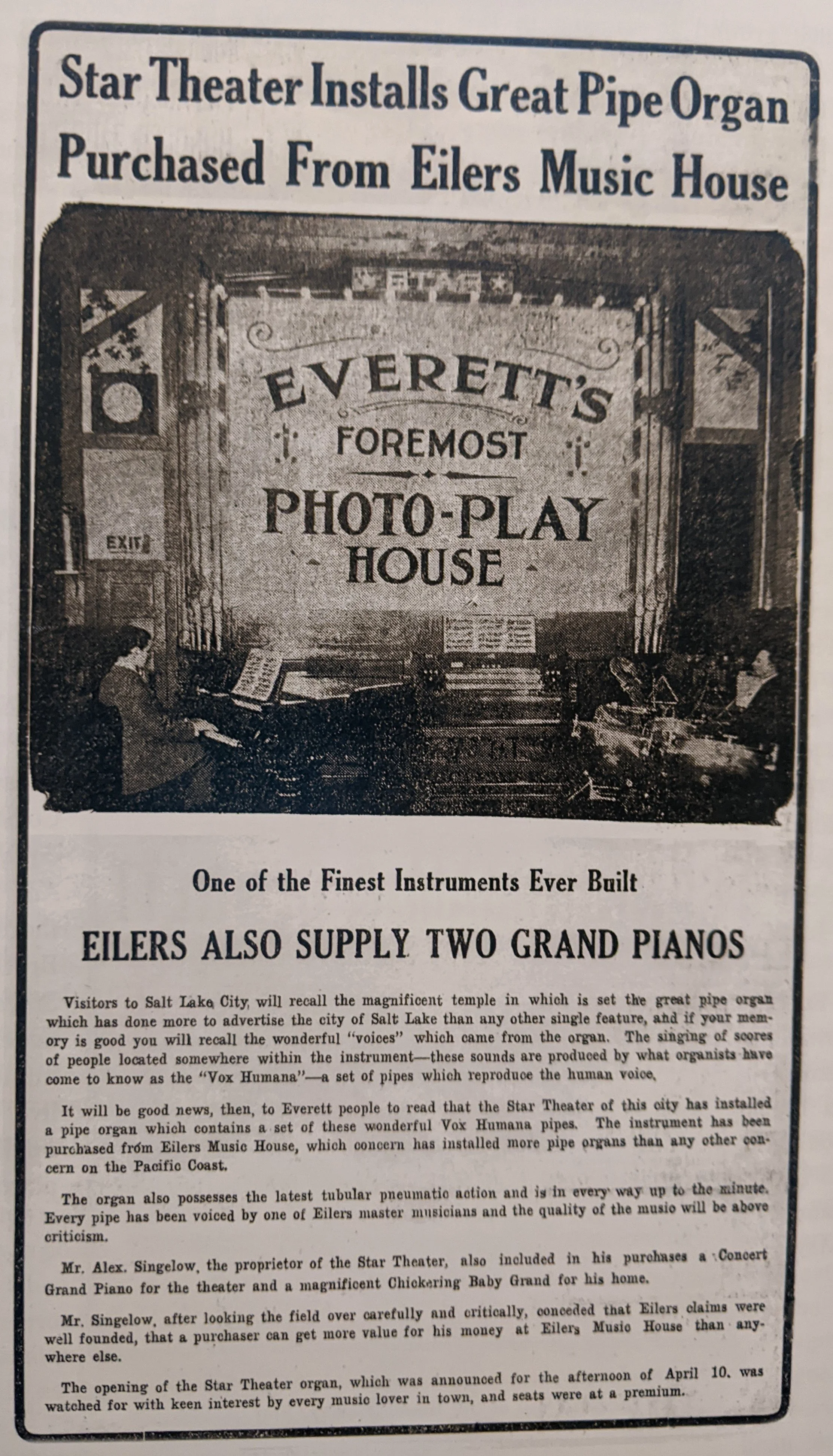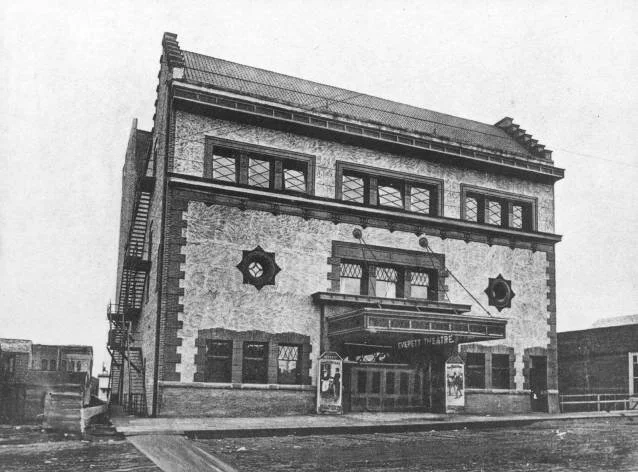Everett Archives: Entertaining Everett
Header image: The Apollo Theater, circa 1926 // Northwest Room, Everett Public Library
Al Jolson was a rising star when he performed on the Everett Theater stage in 1906. His act consisted of “fancy whistling” and singing in blackface, which white audiences at the time thoroughly (and unfortunately) enjoyed. Posters of the act marketed him as “The Vesuvius of Vocal Velocity” with his giant smiling head in blackface, hovering over an exploding volcano. His vaudeville manager, likely responsible for the nonsensical advertising, absconded with the box office receipts after the show - leaving Jolson and his company stranded on the corner of Hewitt and Colby, panhandling for money to catch a train to their next engagement.
1928 Fox-Granada Theater promotion for "On With the Show" // Northwest Room, Everett Public Library
At the turn of the century, vaudeville was the most popular form of entertainment in America. It grew out of the circus and minstrel shows of the mid-19th century, with performers that ran the gamut from comedians and musicians to plate spinners, animal trainers and contortionists.
Joseph St. Peter had great respect and affection for vaudeville, though never having been a performer himself. He ran The Rose Theater at 2922 Wetmore Ave. A “solid, simple and comfortable” venue that seated roughly 700 patrons. Local historian, David Dilgard, described Joe St. Peter affectionately in his book Milltown Footlights: The Theaters of Everett, Washington (Everett Public Library Northwest Room). “Everett saw scores of Theater managers come and go but the rotund St. Peter and his cozy Rose appear to have been made for each other.”
Star Theater pipe organ insert from David Dilgard's Milltown Footlights: The Theaters of Everett, Washington
St. Peter held his theater and the performers who appeared there to the highest standard. So much so, that it was not uncommon for acts to disappear from billing after having received his unsolicited criticism. He would sometimes interrupt an act in progress if he was unhappy with a performance; striding onstage and “escorting the offender to the wings.”
With the advent and growing popularity of “photoplays”, the number of theaters downtown grew to seven, in addition to The Rose. In May of 1919, every other theater in town fell under the management and control of the new corporate entertainment giant, Star Amusement Company, which abruptly closed the Broadway, The Rialoto, and The Princess theaters - consolidating business to its four most profitable movie houses. One of which was The Apollo Theater at 1711 Hewitt. As if to formally welcome “The Roaring Twenties” to town in June of 1920, The Apollo debuted “The Romance of Everett” sponsored by the Everett Daily Herald. A romantic comedy filmed with “a local cast entirely in Everett.”
"The Romance of Everett" Apollo advertisement // David Dilgard's Milltown Footlights: The Theaters of Everett, Washington
The Labor Journal of Everett was less enthusiastic about Star Amusement, specifically their treatment of female employees. The company was formerly blacklisted as an “Unfair Employer” by the publication when Star “locked the girl ushers out” for attempting to unionize.
The success of Star’s fleet also posed a significant threat to Everett’s holdout independent theater, The Rose. Joe St. Peter himself was a rising star in local and state politics, diverting much of his attention and energy to his future and influence in the Republican Party. In 1927, St. Peter sold The Rose to Star Amusement Company. The Rose was gutted and became The Granada Theater - and that same year, debuted the film which brought Al Jolson’s career in Everett full circle; from his penniless, panhandling vaudeville days, to the silver screen with his musical reprisal of blackface in “The Jazz Singer”.
1901 facade of Everett Theatre // Northwest Room, Everett Public Library
Much like the previous decade replaced vaudeville with moving pictures, the 30s ushered in “the talkies” that seemed to eclipse live stage entertainment into obscurity. “Everett entered the Great Depression with three durable movie houses; The Everett, The Granada, and The Balboa,” each enduring until the 1950s. Then came Television …
The Historic Everett Theater stands alone as the sole monument to Everett’s rich and enduring history of live entertainment. Established in 1901, when Everett was emerging from its “Boom Town” days; brimming with rowdy bachelors in boxhouses. Everett Theater elevated the city’s entertainment with its ornate terracotta moldings, tiled roof and crimson drop curtain. Today, the theater is open for the public to enjoy a live show or a movie in the lovingly restored vestige on Hewitt and Colby.
Thanks for reading! Don't forget to subscribe to our monthly newsletter to stay up to date with community news and real estate tips.
You can head back to the main Lamoureux Real Estate website here.








